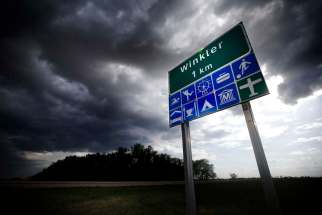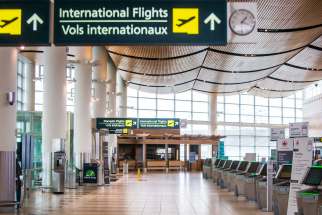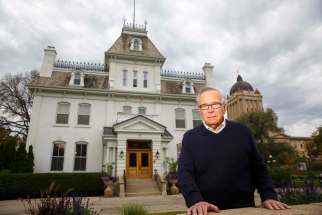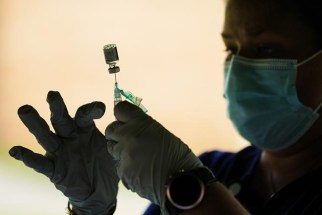A warm-weather winter escape? Well, the cold, hard truth is… Pandemic-pounded Manitobans have access to fewer direct flights to fewer destinations, along with health-care questions and resorts unable to guarantee risk-free R&R
Read this article for free:
or
Already have an account? Log in here »
To continue reading, please subscribe:
Monthly Digital Subscription
$0 for the first 4 weeks*
- Enjoy unlimited reading on winnipegfreepress.com
- Read the E-Edition, our digital replica newspaper
- Access News Break, our award-winning app
- Play interactive puzzles
*No charge for 4 weeks then price increases to the regular rate of $19.00 plus GST every four weeks. Offer available to new and qualified returning subscribers only. Cancel any time.
Monthly Digital Subscription
$4.75/week*
- Enjoy unlimited reading on winnipegfreepress.com
- Read the E-Edition, our digital replica newspaper
- Access News Break, our award-winning app
- Play interactive puzzles
*Billed as $19 plus GST every four weeks. Cancel any time.
To continue reading, please subscribe:
Add Free Press access to your Brandon Sun subscription for only an additional
$1 for the first 4 weeks*
*Your next subscription payment will increase by $1.00 and you will be charged $16.99 plus GST for four weeks. After four weeks, your payment will increase to $23.99 plus GST every four weeks.
Read unlimited articles for free today:
or
Already have an account? Log in here »
Hey there, time traveller!
This article was published 17/09/2021 (1542 days ago), so information in it may no longer be current.
Weary Manitobans wanting a winter escape to a sunny beach in Mexico, the Caribbean or the United States have no shortage of questions on whether a trip south is safe — and indeed possible — as COVID-19 vaccination instils new confidence in travel.
Steinbach-based travel agent Mary Jane Hiebert says she and her colleagues are returning to pre-pandemic client volumes as Manitobans seek help booking an all-inclusive getaway or cruise amid the minefield that is travelling in a pandemic.
What’s the risk?
Manitobans wanting a winter getaway have a lot to consider before booking a trip abroad to warm destinations. Winnipeg-based epidemiologist Cynthia Carr shares some insight into the risks associated with travel, even after being fully immunized.
Manitobans wanting a winter getaway have a lot to consider before booking a trip abroad to warm destinations. Winnipeg-based epidemiologist Cynthia Carr shares some insight into the risks associated with travel, even after being fully immunized.
How concerned should I be about flying?
“The on-aircraft experience is probably one of your least-risky situations, but it’s actually counter to what we think,” Carr said.
“There are examples where outbreaks are linked to air travel but they’re actually very rare. They’re quite unusual. Part of the reason for this is aircraft have a phenomenal air exchange, or ventilation system… the aircraft is set up to prevent air circulating front to back as much as possible, but to keep it going in very specific, more localized areas around your environment.”
So long as passengers follow the safety procedures of the aircraft, including mask use, not travelling while sick and comply with pre-boarding tests or vaccination requirements, flying is a less-risky travel-related activity, Carr said.
“The more risky situation is, where are you going? And what are you doing when you are at the airport?” she said.
What about the destination?
“The first thing any traveller should look at is either the Centers for Disease Control (www.cdc.gov) travel recommendations by destination or Government of Canada travel advice and advisories (www.travel.gc.ca),” Carr said.
Carr said it’s important to understand the level of community spread that’s occurring in the proposed destination and the availability of health services.
“You might not be able to get those health services if that destination is experiencing high levels of COVID and there’s just no room for you to get care,” she said.
It’s also a good idea to check the public-health measures related to restaurants, museums and galleries, public transit, gatherings and more will also help inform travellers about the safety measures being taken by the local government, she said.
“Don’t assume that the place you’re going will have the same public-health measures in place (as Manitoba) with respect to infection, prevention and control,” she said.
Are resorts risky?
Areas where people gather — concert venues, bars, restaurants — can be places with higher risk on a given resort property, Carr said, but if vaccination is a condition of checking in, that risk can be managed.
“Unless the resort has those requirements related to vaccination, you’re not safer at the resort, necessarily, than you are elsewhere, because you don’t know what the vaccination rules are among staff,” she said. “And in some countries not everyone has the same access to health care, so don’t assume anything.”
Carr advises checking for previous reports of outbreaks at any resort under consideration.
— Danielle Da Silva
“Many want to head south — they’re eager, they’re tired — and so right now, I’m getting a lot of questions about what’s required,” Hiebert told the Free Press. “People are anxious to travel and so they’re calling their travel agencies and asking for information and assistance.”
Hiebert, who also chairs the Association of Canadian Travel Agencies, said before the pandemic derailed the winter vacation season in early 2020, demand for travel agency services was trending upward.
And after 18 months of severe restrictions on international tourism, travellers who have flight credits and cruise vouchers burning holes in their wallets are increasingly turning to agents to navigate vaccination and testing requirements, evolving public-health rules and the risk of contracting COVID-19, she said.
“The challenge is that this is such a fluid situation, the requirements and what is necessary just change all the time,” she said.
But the top question she’s hearing from prospective travellers hoping to escape to a resort is “where can I go?”“A lot of the product isn’t even available to sell at this point in time, and that’s just because of the uncertainty of how ready the resorts are at the destination, and that’s probably a bigger challenge that people aren’t even aware of.” — Mary Jane Hiebert, Steinbach-based travel agent
And for the time being, with few direct flights from Winnipeg on the schedule and resorts rebuilding their workforces, the answer is that options are limited, Hiebert said.
“A lot of the product isn’t even available to sell at this point in time, and that’s just because of the uncertainty of how ready the resorts are at the destination, and that’s probably a bigger challenge that people aren’t even aware of,” she said.
Air carriers are also slowly, and cautiously rebuilding their routes and recalling laid-off staff.
“It’s a huge operation to get your charter aircraft back on a schedule,” she said, adding that many popular destinations in Mexico are not being offered out of Manitoba this year.
Airlines are also moving slowly when it comes to opening sales with the possibility of increased COVID-19 spread through the fall and winter driven by the delta variant or another that emerges, posing a threat to travel plans, Hiebert said.
“People are very eager to book and what we don’t want to find is ourselves in a situation where we’ve got packages that are booked, and then we’ve got to cancel the flights,” she said.
Tyler MacAfee, vice-president of communications and government relations with the Winnipeg Airports Authority, said airlines have planned for 50 per cent of their pre-pandemic demand for sun destination travel, with just 11 routes on the schedule at this time.
“If the pandemic has taught us anything it’s that things can change really quickly. But where we’re at right now is there’s a renewed confidence that we’re on the right track now, and that the worst is behind us and we’re able to move forward,” MacAfee said.
“At the same time, we know the recovery is going to take a while. People are going to be more cautious. The airlines and airports are doing what they can to build that consumer confidence, and I think we’ll see that gradual return.”
International flights to Winnipeg were paused in February when the federal government limited arrivals to Canada to Toronto, Montreal, Calgary and Vancouver to slow the spread of COVID-19 and its variants.“If the pandemic has taught us anything it’s that things can change really quickly.” — Tyler MacAfee, vice-president of communications and government relations with the Winnipeg Airports Authority
They were allowed to resume Aug. 9, and for the first time in nearly eight months, Winnipeg’s Richardson International Airport welcomed a Delta Air Lines flight from Minneapolis earlier this week.
MacAfee said the routes taking travellers direct from Winnipeg to a sunny destination in the United States this winter include Orlando, Palm Springs, Phoenix and Las Vegas and seven other destinations in Mexico, Cuba and Jamaica.
It’s possible more destinations will become available as talks continue between the airport and air carriers, he said.
Before booking, travellers must also make a decision about their own tolerance for risk in addition to considering the increased expense of pandemic travel, Hiebert said.
Pre-departure research should include the vaccination requirements of a destination, resort policies on immunization status of staff and guests, masking and physical-distancing requirements on properties and in the surrounding community, and the availability and capacity of health services, she said.
Some resorts will have doctors and COVID-19 testing on site, she said, though the PCR test currently required to return to Canada is not always included in vacation packages and can cost as much as $1,000, depending on the country.
“(Resorts) have been able to modify and shift a little bit,” she said. “Certainly tourism is such a huge industry in places like Cuba, for example, that they’re going to do whatever is necessary to get their numbers back up.”
danielle.dasilva@freepress.mb.ca

Our newsroom depends on a growing audience of readers to power our journalism. If you are not a paid reader, please consider becoming a subscriber.
Our newsroom depends on its audience of readers to power our journalism. Thank you for your support.









